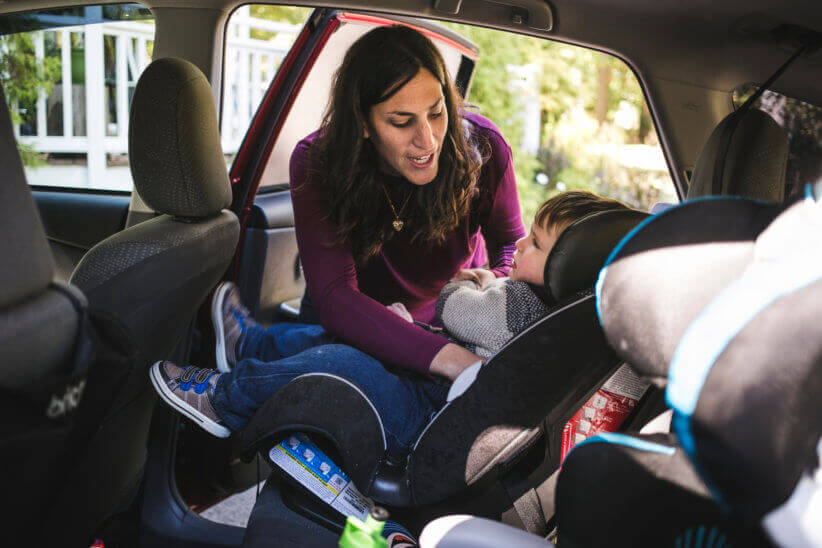When a child is born, much emphasis is placed on helping the new mother and baby adjust. But they aren’t the only ones undergoing change. Most first-time fathers experience stress due to sleep deprivation, change in routines, and their own apprehensions about parenting.
“There are a myriad of emotions that come with being a new father,” says Armin Brott, author of multiple books and one DVD on fatherhood. “Most often, it’s a feeling of pride and excitement. At the same time there can be apprehensions — ‘Will I be a good father?’ ‘Can we afford this?’ ‘How is this going to change our lives?’ ”
This was what David Wuttke found.
“When my son David Jr. was born, I had overwhelming feelings of anxiety and excitement all at once,” he says. “I had been babysitting since I was 16, so my anxiety wasn’t about child care. It was the reality of the responsibility that this was my son. And that sent a shock to my system.”
Just knowing there’s another person to care for can be a big stressor for first-time fathers. Couple that with the fact that many men don’t initially know how to bond with their newborns.
“If a mother is nursing, it naturally brings her in contact with the baby,” says Brott. “Dads don’t have that same natural bonding method, so they often get stuck doing the dirty work. But it shouldn’t be that way.”
Susan Maroto, licensed social worker and parent educator in prenatal care and postpartum adjustment, agrees.
“There are things moms can do to help dads feel competent in that role,” she says. “Encourage them to take part in all areas of child care — feeding, bathing, reading, and putting the baby down. Just be careful you aren’t overly critical. Standing behind your husband and correcting his every move will only frustrate him. Show him what needs to be done, then let him develop his own style.”
Fortunately for Wuttke, basic training occurred as a teen sitter and paid big dividends when his son was born. Soon after his wife Christine delivered, she enrolled in college and David was thrust into solo evening child care.
“I never had to think about how to take care of David. I just fell back on my babysitting days,” says Wuttke. “If he was crying, I would say, ‘Okay, let’s guess what he needs?’ Then I’d check his diaper. If that was okay, I’d try to feed him. If he wasn’t hungry, I thought maybe he had gas or needed to sleep. One of those usually did the trick.”
For Anthony Franco, the adjustment wasn’t that easy. When his wife Lisa gave birth to twins, Franco seemed to be fine. But four months into it, things changed.
“I started experiencing panic attacks and didn’t know why,” he remembers. “I would be in the supermarket when all of the sudden I would get this overwhelming sense of dread and lightheadedness.”
This went on for several months until Franco finally went to the doctor.
“He asked me where it was happening, and I told him it was when I was buying diapers, formula, and other things for the twins,” he continues. “That’s when he pinpointed the problem. He said this happens to a lot of new fathers. He prescribed a little anti-anxiety medication and then I was fine.”
Brott believes it’s important for men to have someone with whom they can share their stress.
“Some men have close friends they can confide in. But a lot don’t, so they keep all of those concerns in and the stress level builds,” he says. “They shouldn’t be afraid to talk with other men and find out what they have gone through. Chances are they’ll find others felt the same way, too.”
One concern most new fathers share is fatigue. Franco and Wuttke both had a hard time with this.
“The one thing I really didn’t expect was that time on a 24-hour clock had no meaning anymore,” says Franco. “It became irrelevant after a while, and we just fit sleep in whenever we could.”
The Wuttkes solved this problem by enlisting the help of relatives.
“There were times Chris and I said, ‘We need a break,’ and my mom would take David, so we could rest. We even called my grandparents, so we could have an occasional night out.”
Extended family and friends can be a huge help or add significant stress, depending upon the dynamic of the relationship, say experts. This is where husbands can help their wives by setting boundaries.
“Dad should take the role of communicator outside the family, and if needed, limit visitors,” says Maroto. “Encourage others to help in practical ways such as dropping off meals, running errands, or watching the baby for 20 minutes, so the couple can take a quick walk.”
What’s most important is to realize this is a period of adjustment and life does get easier.
“It’s like anything new, it takes a little time,” says Franco. “It took about 18 months before I became completely comfortable with the twins. Now we’re pretty much inseparable.”
Denise Yearian is the former editor of two parenting magazines and the mother of three children and four grandchildren.
Resources for new fathers
Books and DVDs:
• “Be Prepared: A Practical Handbook for New Dads” by Gary Greenberg and Jeannie Hayden
• “The Expectant Father: Facts, Tips, and Advice for Dads-to-Be” by Armin Brott
• “The Father’s Almanac: From Pregnancy to Pre-school, Baby Care to Behavior, the Complete and Indispensable Book of Practical Advice and Ideas for Every Man Discovering the Fun and Challenge of Fatherhood” by S. Adams Sullivan
• “New Father Book: What Every New Father Needs to Know to be a Good Dad” by Wade F. Horn, Ph.D. and Jeffrey Rosenberg, MSW
• “Toolbox for New Dads: Because Babies Don’t Come with Instructions” by Armin Brott (DVD)
Websites:





















